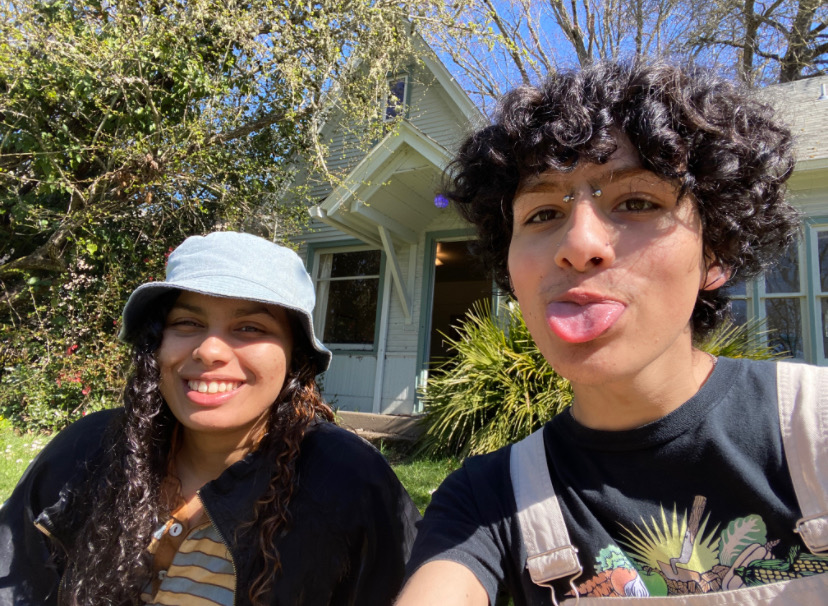In mid-June, Justice Martinez and Lucy Cervantes received a daunting text from their landlord. The roommates would be served an eviction notice on June 30 — when Oregon’s eviction moratorium was initially set to expire — unless they paid the $5,258 rent and utility bill they owed the rental housing company.
The bill had ballooned while both roommates were unemployed due to the COVID-19 economic shutdown. Martinez, who uses they/their pronouns, says they did not qualify for unemployment, and Cervantes, who has been trying to claim weekly benefits, has not heard back from the Oregon Employment Department since she was laid off.
Through GoFundMe, Cervantes and Martinez raised the $7,500 they owed their landlord, including $1,735 in rent and utilities for July, in just over a week. Martinez says they shared the GoFundMe repeatedly online through Twitter and other social media accounts. They attribute the success of the campaign to donations from college kids, Black, Indigenous, people of color and people in the LGBTQIA community.
“It is a relief for sure, and we are really appreciative of it because honestly we didn’t even think we were gonna make it,” Martinez says.
But their crowdfunding campaign has not brought Cervantes and Martinez economic stability.
“It’s just one less thing to worry about on top of all the other things we have to deal with,” Cervantes says. “Yeah, we were able to get our rent paid off, but what do we do for jobs now?”
Affordable housing advocates say the extreme housing instability Cervantes and Martinez are experiencing is all too common during the COVID-19 economic shutdown, which has only exacerbated the pre-pandemic housing crisis in Eugene. For residents of color, like Martinez, who is Chicanx, and Cervantes, who is Afro Latina, that crisis is compounded by systemic underinvestment and discrimination.
Kaarin Knudson, project lead at Better Housing Together, says the housing crisis in Eugene affects many middle- and lower-income households, but it particularly affects communities that have been financially neglected and discriminated against. “Our BIPOC [Black, Indigenous, people of color] neighbors face discrimination and structural inequalities that make a bad housing crisis worse,” she tells Eugene Weekly.
Calls to the Springfield Eugene Tenant Association (SETA) tenant hotline have doubled in recent months from pre-COVID-19 levels, according to Tim Morris, SETA board president. “Renters are really concerned about losing their homes and trying to pay rent,” Morris says.
In Eugene, 39 percent of all households are considered cost burdened by their housing, meaning more than 30 percent of their income goes to keeping a roof over their head, according to the 2020 Eugene-Springfield consolidated plan. The five year strategic plan for housing and community development shows that Black households are disproportionately represented among all households facing a severe cost burden for housing. Forty-two percent of Black households spend 50 percent or more of their income on housing costs.
Eric Richardson, executive director of Lane County NAACP, says a combination of factors make it challenging for some Black and low-income residents to find secure housing. Failures in the Oregon education system are high on his list — a 2017 report from Kairos PDX, a Portland-based nonprofit organization focused on serving under-represented students, shows 61 percent of Black high-school students graduated in 2016.
Richardson says the combination of job discrimination, Oregon’s lack of support for Black students,, and a tight housing and job market have wide implications: “You are going to find that those people are going to be the ones having the hardest time finding appropriate housing, or they are the ones spending too much on housing just to live here.”
Martinez and Cervantes say microaggressions related to gender identity and skin color have contributed to their job and housing insecurity and affected their mental health. In the pilot episode of their podcast, Weirdo Alert, Cervantes describes how the negative treatment she faced made her feel sick to her stomach with anxiety before her restaurant shifts.
Richardson says disparities in the cost burden faced by different residents affect how they are able to engage in the community. Residents who have to pay more than 50 percent of their income to cover housing costs won’t be able to participate in “the façade of middle-class America”— going to the mall, buying books at bookstores, and seeing a movie at a movie theatre.
“You may go to certain spaces in our community where you just don’t see people of color because they don’t have the disposable income to be in those spaces,” Richardson says. “So that creates segregation.”
In the long term, Richardson says, “lessening racism and distrust in our community will allow more people of color to engage and thrive.”
Knudson says implementing long-term affordable housing strategies, such as House Bill 2001, passed by the Legislature in 2019, will eventually help equalize housing disparities.
“I’m hopeful that as we address this new chapter in our housing crisis, it gives us a stronger will to implement the housing policies and reach the goals we’ve had for many years because it’s needed more than ever,” Knudson says.
In the short term, the state has taken a number of measures to assist renters. In May, Oregon Housing and Community Services distributed $8.5 million in rent assistance to action agencies across the state to assist Oregonians struggling to pay rent during the COVID-19 crisis, according to the state news website.
In late June, the state distributed $70 million to local organizations in Oregon to support rental relief and energy assistance. The state-wide eviction moratorium has also been extended until Sept. 30 and provides renters the opportunity to pay back their rent until March 31, 2021. Lane County also recently offered rent assistance program through the CARES Act.
Cervantes and Martinez are waiting to receive rent assistance through Centro Latino Americano. In mid-July, Martinez was hired to work at a restaurant preparing food. Cervantes is still job searching.
Both roommates made use of their free time during the pandemic to get creative. Cervantes says, “I’ve been playing around with a music program.” Before getting the job, Martinez was busy too. “I’ve been drawing more, reading more.”
Martinez and Cervantes’ podcast, Weirdo Alert, is available on SoundCloud under their account, Lucy and Justice. The pilot episode is called “Work Injustices We’ve Faced Living in Oregon.”
A Note From the Publisher

Dear Readers,
The last two years have been some of the hardest in Eugene Weekly’s 43 years. There were moments when keeping the paper alive felt uncertain. And yet, here we are — still publishing, still investigating, still showing up every week.
That’s because of you!
Not just because of financial support (though that matters enormously), but because of the emails, notes, conversations, encouragement and ideas you shared along the way. You reminded us why this paper exists and who it’s for.
Listening to readers has always been at the heart of Eugene Weekly. This year, that meant launching our popular weekly Activist Alert column, after many of you told us there was no single, reliable place to find information about rallies, meetings and ways to get involved. You asked. We responded.
We’ve also continued to deepen the coverage that sets Eugene Weekly apart, including our in-depth reporting on local real estate development through Bricks & Mortar — digging into what’s being built, who’s behind it and how those decisions shape our community.
And, of course, we’ve continued to bring you the stories and features many of you depend on: investigations and local government reporting, arts and culture coverage, sudoku and crossword puzzles, Savage Love, and our extensive community events calendar. We feature award-winning stories by University of Oregon student reporters getting real world journalism experience. All free. In print and online.
None of this happens by accident. It happens because readers step up and say: this matters.
As we head into a new year, please consider supporting Eugene Weekly if you’re able. Every dollar helps keep us digging, questioning, celebrating — and yes, occasionally annoying exactly the right people. We consider that a public service.
Thank you for standing with us!

Publisher
Eugene Weekly
P.S. If you’d like to talk about supporting EW, I’d love to hear from you!
jody@eugeneweekly.com
(541) 484-0519
